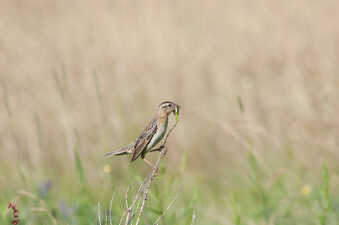Protect Grassland Birds by Mowing Later
MONTPELIER, Vt. — Bobolinks, Savannah sparrows and eastern meadowlarks populations have suffered dramatic, long-term declines due to the loss of their grassland habitat.
"These species have experienced declines across the continent, but on Vermont's grasslands, especially in larger fields and more open landscapes, there are ways we can help," said Rosalind Renfrew, biologist for the Vermont Fish and Wildlife Department.
Landowners can make a difference by altering the times of year they mow fields. Fish and Wildlife is encouraging landowners to help these beloved species by waiting to mow fields used by grassland birds, giving them a chance to rear their young.
"People maintain open, grassy fields in Vermont for a variety of reasons, from producing hay to providing pasture for grazing, to simply maintaining scenic beauty," said Renfrew. "Mowing or brush hogging are the most common ways Vermonters maintain a grass landscape. For those who can afford it, mowing schedules can be timed to allow grassland birds to successfully raise chicks."
Bobolinks, savannah sparrows and eastern meadowlarks build nests right on the ground, among the grasses and wildflowers. Deer fawns, wild turkey chicks and other animals also take refuge in grass fields.
According to Renfrew, landowners who do not need to mow for animal forage can accommodate nesting birds by cutting late in the summer, preferably after August 1.
People concerned about invasive plants may choose to sometimes mow a section of their field more frequently, to keep invasive plants in check. "It can mean temporarily sacrificing part of the field," says Renfrew, "but it can better maintain quality habitat for the birds over the long term."
Landowners who face a loss of income from delayed mowing can apply for assistance through the Natural Resources Conservation Service or The Bobolink Project.
Tags: birds,

